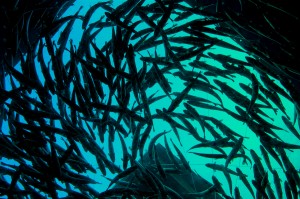
The Royal Society of Canada (RSC) is kind of a big deal, composed of Canada’s most distinguished scholars, scientists and artists. These are people who know an awful lot about an awful lot, and when they have something to say, it’s probably a good idea to listen. Yesterday they spoke out about the way Canadians are managing their ocean territories. Their message: we need to seriously clean up our act.
About once a year, a handful of RSC fellows and some clever invited guests put their awesome collective brainpower together to tackle a “critical issue of public policy.” The are not paid, and not even necessarily asked; they do this out of the goodness of their hearts, as a service to Canadians. Last year they looked at the impact of Alberta’s oil sands, one of the most authoritative, thorough, and balanced reviews of the subject I’ve yet seen. This year they tackled ocean climate change and marine biodiversity, an important topic for the country with more coastline than any other. They asked questions about the potential impacts of climate change, fishing/overfishing, and aquaculture, as well as about our international responsibilities, and how we are living up to them. Those familiar with our record on environmental issues will not be surprised to hear there was more bad news than good.
The full report is available online, but I was lucky enough to hear the results from the lead authors first-hand, thanks to a helpful teleconference organized by the Science Media Centre of Canada. Here, in a nutshell, is what they had to say:
Our oceans are threatened. Climate change is making them warmer and less salty, as well as more acidic. Many deep water areas are losing oxygen, sea ice is disappearing. Overfishing has seriously depleted many species, and has adversely affected biodiversity and habitat. Some species are headed for extirpation (local extinction).
A prime example is Atlantic cod. Everyone knows the sad story, but few may realize its full extent, so here are some figures: between the 1960s and the 1990s we lost 2 billion cod. That’s enough fish to fill the CN tower 328 times. Today we harvest about 25,000 tonnes of cod per year; if they were allowed to recover to their full extent, it is estimated the maximum sustainable yield (the amount you could catch without depleting the stocks) would be 500,000 tonnes.
We have a responsibility, and we’re not meeting it. Canada’s is way behind the times when it comes to regulating its fisheries. The Fisheries Act was passed in 1868, long before anyone considered the possibilities of overfishing or climate change. It created the Department of Fisheries and Oceans (today it’s Fisheries and Oceans Canada, but everyone still calls it the DFO) but gave it a weird dual mandate: it’s supposed to both promote exploitation of resources (ie. fish) AND take care of their conservation.
The Oceans Act, passed in 1996, was supposed to make “a legal commitment to conserve, protect and develop the oceans in a sustainable manner.” But according to the RSC report’s authors, the act is vague and toothless, and implementation has been slow. The Fisheries minister still has enormous discretion to issue or not issue licenses as he or she sees fit, rather than being tied to science-based limits or targets. Again, cod are a prime example: 20 years after the collapse of the fishery, there is still no coherent plan to allow the stocks to recover. In the words of Jeffrey Hutchings, the chair of the expert panel: “If you have no plan, you have no accountability.”
The panel makes several recommendations. They want to see regulatory conflicts of interest resolved, and a reduction of discretionary power of DFO: more science, less guesswork. We need to work harder to implement the good policies we do have, and to fulfil our international commitments. This could even include a complete overhaul of the Fisheries Act to bring it in line with what countries like Australia, New Zealand, the US and Norway. And we need to continue to do good science, including monitoring, to provide the necessary data on which to make sound decisions.
But the question of why we are so behind in the first place still nags at me. Again, I think Prof. Hutchings hit the nail on the head: “Those who are most interested in what happens in the oceans are the fishing companies and the coastal communities; it tends not to be people in downtown Toronto or in Saskatoon,” he said. “The ocean is distant for those people, it’s out of sight and out of mind.” This is no excuse; all Canadians need to step up and take responsibility for what’s going on in our coastal waters. Let’s not let this become another embarrassment for our already-strained environmental reputation.
P.S. My mentor Bob had a good post up on this very issue last summer; it’s worth a read.
No comment yet, add your voice below!